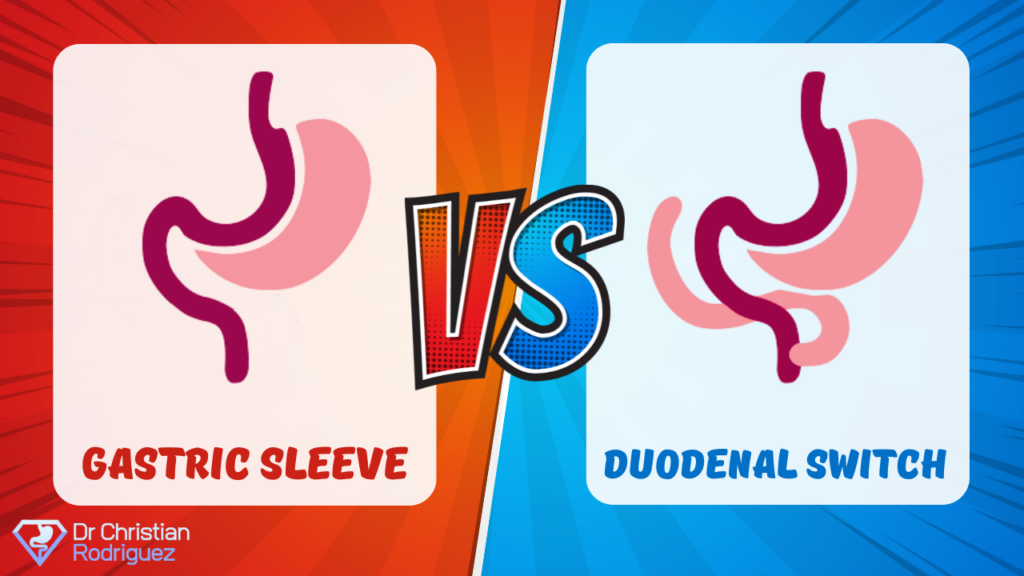When considering weight loss surgeries, many patients find themselves comparing gastric sleeve vs duodenal switch surgery. Both are popular bariatric procedures, yet they vary in their techniques and the expected weight loss results they produce. Understanding these differences can help you decide which weight loss procedure best fits your weight loss goals and conditions.
What is Gastric Sleeve Surgery?
Gastric sleeve surgery, also known as sleeve gastrectomy, is a dominant bariatric procedure today. During this procedure, a bariatric surgeon removes about 75–80% of the stomach, leaving a sleeve-shaped section. This condensed stomach not only reduces the amount of food you can eat but also helps you feel full faster by decreasing hunger hormones like ghrelin and other satiation sensors that connect your brain to eating.
Key Benefits of Gastric Sleeve Surgery:
- It’s a less complex procedure compared to others, such as gastric bypass surgery or duodenal switch.
- Patients experience significant excess weight loss, often losing 50–60% of their excess body weight within the first 12–18 months.
- It effectively improves or resolves type 2 diabetes and other obesity-related health conditions.
However, sleeve gastrectomy restricts food consumption without altering nutrient absorption like other procedures.
What is Duodenal Switch Surgery?
![]()
The duodenal switch surgery, also known as biliopancreatic diversion with duodenal switch (BPD/DS), combines aspects of the sleeve gastrectomy and a bypass of the small intestine.
During this procedure:
- A sleeve-shaped stomach is created, similar to gastric sleeve surgery.
- Reroute the small intestine to reduce calorie and nutrient absorption significantly.
This twofold approach makes the duodenal switch the most intense obesity-treating procedure for patients with a high BMI and metabolic disorders like type 2 diabetes.
Key Benefits of Duodenal Switch Procedures:
- Patients typically achieve greater excess weight loss, often losing 70–80% of their excess body weight.
- It offers the best long-term results for type 2 diabetes resolution.
However, the BPD/DS is more invasive and requires long-term monitoring for nutrient deficiencies and vitamin supplementation for life.
Gastric Sleeve vs. Duodenal Switch: A Direct Comparison
Here’s how these two weight loss surgeries compare:
| Factor |
Gastric Sleeve |
Duodenal Switch |
| Weight Loss Results | Lose 50–60% of excess body weight | Lose 70–80% of excess body weight |
| Mechanism | Restrictive | Restrictive and malabsorptive |
| Health Conditions | Resolves many obesity-related issues | Highly effective for severe obesity and type 2 diabetes |
| Nutritional Considerations | Minimal risk of deficiencies | Higher risk; requires lifelong supplements |
| Complexity of Surgery | Less invasive | More invasive |
Who Should Consider Gastric Sleeve Surgery?
Gastric sleeve surgery is ideal for patients who:
- Lower BMI and are seeking a straightforward procedure.
- Resolve obesity-related health issues without significant lifestyle changes.
- Fewer nutritional risks compared to duodenal switch surgery.
Who Should Consider Duodenal Switch Surgery?
Duodenal switch procedures are best suited for patients who:
- Have a high BMI or struggle with severe obesity.
- Maximum weight loss results.
- Health conditions like type 2 diabetes.
- Are prepared for the long-term commitment of managing nutrient absorption and supplementation.
Gastric Bypass vs. Duodenal Switch
Another comparison often arises between gastric bypass surgery and duodenal switch. While both surgeries involve altering the digestive tract to restrict nutrient absorption, the duodenal switch is generally used to maximize weight loss and obesity-related conditions. Gastric bypass, however, may be a better option for those seeking a middle ground or experiencing acid reflux/GERD.
How Bariatric Surgeons Decide the Right Procedure
The decision between gastric sleeve surgery, duodenal switch, or even gastric bypass often depends on individual factors, including:
- The amount of weight a patient needs to lose.
- Existing health conditions like type 2 diabetes or acid reflux.
- Personal preferences and willingness to adhere to post-operative guidelines.
Bariatric surgeons conduct thorough evaluations, often including imaging tests and consultations, to determine the most suitable option.
Post-Surgery Comparison
Regardless of the procedure chosen, success in bariatric surgery relies on a patient’s commitment to lifestyle changes. Patients must adopt healthier eating habits, follow supplementation guidelines, and attend regular follow-ups with their surgical team. These steps are essential to maximize weight loss and maintain results over the long term.
Conclusion
Both gastric sleeve surgery and duodenal switch procedures offer life-changing benefits for individuals struggling with obesity. While the gastric sleeve is less invasive and provides substantial weight loss results, the duodenal switch offers unmatched effectiveness for those with severe obesity and metabolic conditions.

